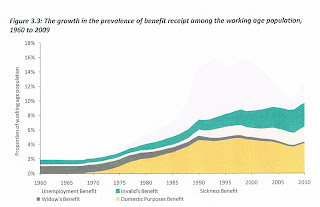There is not the space here to list the policies developed to implement the framework, but it is worth noting that they were the result of a concerted effort to draw on the best of international and national thinking.
Did it work? Yes. Unemployment fell dramatically and the number of people on the domestic purposes benefit declined.
Unlike in all other OECD nations, the increase in the number of people claiming a benefit because of a disability or an illness began to slow.
Note the green band and below represent people who generally spend many more years on a benefit than those on the unemployment benefit. The vertical axis shows percentage of the working-age population. So under Labour inroads into dependence was not the big-tick achieve Maharey claims.
Evaluation showed that the policies made a measurable difference. Treasury was so impressed when $300 million was returned to it in one year that it made the advances in social policy a feature in its annual report.
Despite this, when a change in government occurred, it was as if a new start had to be made. A welfare reform working party was established and it operated as if in a vacuum.
Years of experience were wasted. Now, we have a new policy framework which seems to be based on the idea that benefit numbers are rising because people do not want to work. History teaches us that this assumption is not well founded. There are those for whom work is anathema, but most people take work if they have the skills for the job, it pays a wage they can live on and details, such as having a safe place for their children to stay, are taken care of.
Sole parents are a good example. Although current policy portrays sole parents on a benefit as young and irresponsible, they are typically women in their early 30s who have left a relationship. They stay on the benefit for a few years at most and then get on with their lives.
How much better current policy would be if it had built on previous experience.
Maharey is still grinding the organ. We now have new research that presents rather a different picture. For example,
"How much better current policy" is now it is evidence-based.On average, sole parents receiving main benefits had more disadvantaged backgrounds than might have been expected:· just over half had spent at least 80% of the history period observed (the previous 10 years in most cases) supported by main benefits· a third appeared to have become parents in their teenage years.This reflects the over-representation of sole parents with long stays on benefit among those in receipt at any point in time, and the longer than average stays on benefit for those who become parents as teenagers.







